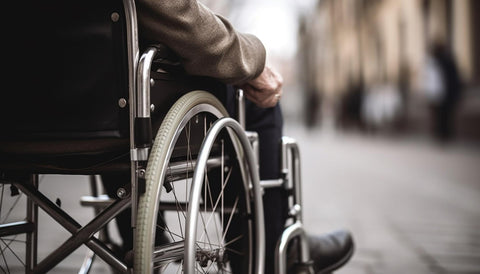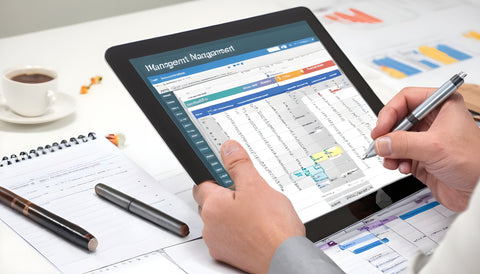As our loved ones age, it becomes increasingly important to ensure they have a safe and comfortable environment to live in. Care at home for elders is a top priority, and having the right essential items can make all the difference. In this blog post, we will e
As our loved ones age, it becomes increasingly important to ensure that they have a safe and comfortable environment to live in. Care at home for elders is a top priority, and there are several essential items that can greatly improve their quality of life. Whether you are a caregiver or a family member, these items can make a significant difference in promoting independence and well-being. In this blog post, we will explore some of the essential items that are crucial for care at home for elders.
1. Mobility Aids

One of the most important aspects of care at home for elders is ensuring their mobility. Mobility aids such as walkers, canes, and wheelchairs can provide the necessary support and stability for seniors to move around safely. These aids can help prevent falls and injuries, allowing elders to maintain their independence and continue with their daily activities.
2. Bathroom Safety Equipment
The bathroom can be a hazardous area for seniors, but with the right safety equipment, it can be made much safer. Items such as grab bars, raised toilet seats, and non-slip bath mats can greatly reduce the risk of accidents and falls. Installing these safety measures can provide peace of mind for both the elders and their caregivers.
3. Medication Management Tools

Managing medications can be a complex task, especially for elders who may have multiple prescriptions. Medication management tools such as pill organizers and automatic pill dispensers can help ensure that medications are taken correctly and on time. These tools can also help prevent medication errors and improve medication adherence.
4. Home Safety Devices
Home safety devices are essential for creating a secure environment for elders. Smoke detectors, carbon monoxide detectors, and emergency call systems are just a few examples of devices that can provide added safety and peace of mind. These devices can alert both the elders and their caregivers in case of emergencies, allowing for prompt action.
5. Comfortable and Supportive Furniture
Comfort is key when it comes to care at home for elders. Investing in comfortable and supportive furniture can greatly enhance their overall well-being. Ergonomic chairs, adjustable beds, and pressure-relieving mattresses can help prevent discomfort and promote better sleep. Additionally, furniture with features like easy-to-reach storage compartments can make daily tasks more convenient for elders.
6. Assistive Devices for Daily Living
Assistive devices can greatly improve the independence and functionality of elders in their daily activities. Items such as reachers, dressing aids, and jar openers can make tasks like dressing, cooking, and opening containers much easier. These devices can help elders maintain their autonomy and reduce the need for assistance.
7. Communication and Entertainment Tools
Staying connected with loved ones and having access to entertainment is crucial for the mental well-being of elders. Communication tools such as smartphones, tablets, or video calling devices can help them stay in touch with family and friends. Additionally, devices like e-readers, audiobooks, or streaming services can provide entertainment and mental stimulation.
By ensuring that these essential items are available in the home, caregivers and family members can greatly improve the care at home for elders. These items promote safety, independence, and overall well-being, allowing our loved ones to age gracefully and comfortably in their own homes.
Explore the must-have items that can enhance the quality of life for seniors.
1. Mobility Aids
Many elders face mobility challenges, which can greatly impact their independence. Investing in mobility aids such as walkers, canes, or wheelchairs can provide the necessary support and stability for seniors to move around their homes with ease.
2. Bathroom Safety Equipment
The bathroom can be a hazardous area for seniors. Installing grab bars near the toilet and in the shower can prevent slips and falls. Additionally, non-slip mats and shower chairs can provide extra stability and reduce the risk of accidents.
3. Medication Management Tools
Seniors often have multiple medications to take, and it can be challenging to keep track of them all. Medication management tools such as pill organizers or automatic dispensers can help ensure that the right medications are taken at the right time, reducing the risk of missed doses or accidental overdoses.
4. Home Security Systems
Home security systems are not only for protecting against intruders but also for ensuring the safety of seniors. Installing a reliable security system with features like emergency buttons or medical alert systems can provide peace of mind for both the seniors and their caregivers.
5. Comfortable Bedding and Furniture
A good night's sleep is essential for overall well-being. Investing in comfortable bedding, such as supportive mattresses and pillows, can help alleviate common issues like back pain. Additionally, having ergonomic and supportive furniture can make daily activities more comfortable for seniors.
6. Communication Devices
Staying connected with loved ones is crucial for seniors' mental and emotional well-being. Providing them with user-friendly communication devices, such as smartphones or tablets, can enable them to easily connect with family and friends through calls, video chats, or social media.
7. Adequate Lighting
Poor lighting can increase the risk of falls and accidents. Ensuring that the home has adequate lighting in all areas, especially stairways, hallways, and entrances, can greatly enhance safety for seniors. Consider installing motion sensor lights for added convenience.
8. Assistive Devices for Daily Activities
There are various assistive devices available that can make daily activities easier for seniors. Examples include reachers or grabbers to retrieve items from high shelves, jar openers, or utensils with ergonomic handles. These devices can promote independence and reduce strain on aging bodies.
9. Emergency Preparedness Supplies
Being prepared for emergencies is crucial for seniors living at home. Stocking up on essential supplies such as non-perishable food, water, flashlights, batteries, and a first aid kit can ensure that they are ready for unexpected situations like power outages or severe weather events.
10. Personal Emergency Response System
A personal emergency response system is a wearable device that allows seniors to call for help in case of an emergency. These devices often come with a panic button that connects them to a monitoring center, providing immediate assistance when needed.
By equipping the home with these essential items, caregivers can create a safe and comfortable environment for their elderly loved ones. Prioritizing care at home for elders not only enhances their quality of life but also provides peace of mind for everyone involved.
Image Credits:
<a href="https://www.freepik.com/free-ai-image/paraplegic-patient-sitting-wheelchair-receiving-care-generated-by-ai_42308708.htm#query=Mobility%20Aids&position=1&from_view=search&track=ais_ai_generated&uuid=422c64b7-330c-418f-8b63-e73ecb5006d0">Image By vecstock</a>

